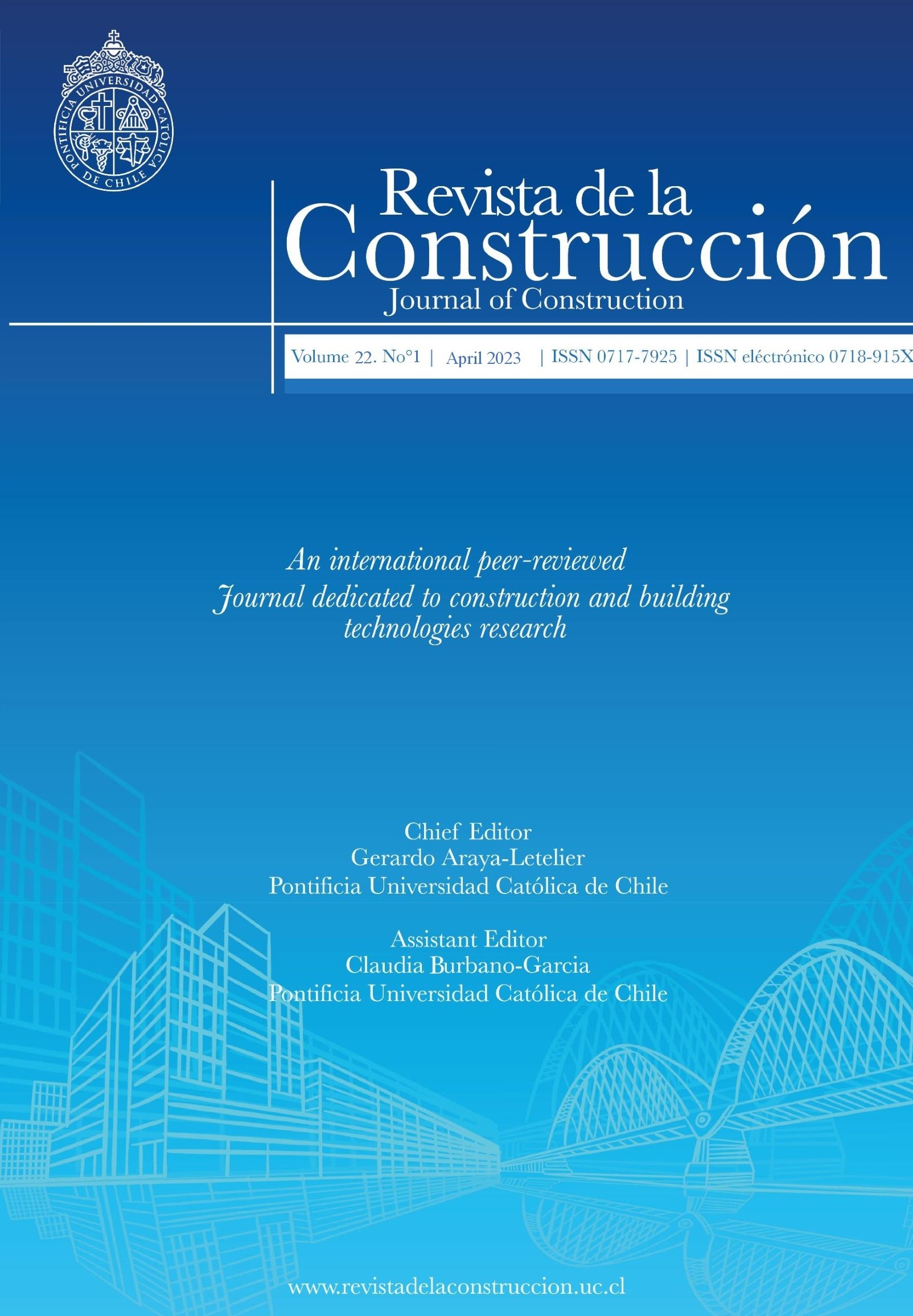Effect of polyethylene terephthalate (PET) and polypropylene (PP) fibers on the shear behavior of RC deep beams
DOI:
https://doi.org/10.7764/RDLC.22.1.223Abstract
Today, environmental health needs more attention than in the past. Objects consisting of plastic materials such as bottles take many years to decompose. Therefore, in the recent years, a lot of research has been done to reuse them and one of which is use in the concrete mixes. In previous research, very low percentages of these materials (between 0.5% and 1.5%) has been used as fine aggregate substitutes in the concrete and evaluations have more focused on the flexural strength. In this research, Polyethylene terephthalate (PET) as a substitute for sand and Polypropylene fibers (PP) as an additive material are used in the concrete mixes. 14 concrete beams in both reinforced and unreinforced states have been evaluated. The replacement percentage of the PET is 10, 30 and 60% and additive percentage of the PP is 0.5, 1.5 and 3% of the total weight of concrete. The dimensions of the beams have been chosen in such a way to categorized in the deep beams. So, rectangular cross-section has been considered (width = 100mm and height = 400mm). Shear strength and ductility are two important parameters that have been evaluated in this research.
Downloads
References
Adnan, H. M., & Dawood, A. O. (2020). Strength behavior of reinforced concrete beam using re-cycle of PET wastes as synthetic fibers. Case Studies in Construction Materials, 13, e00367. https://doi.org/10.1016/j.cscm.2020.e00367
Akın, S. K., Kartal, S., Müsevitoğlu, A., Sancıoğlu, S., Zia, A. J., & İlgün, A. (2022). Macro and micro polypropylene fiber effect on reinforced concrete beams with insufficient lap splice length. Case Studies in Construction Materials, 16(January). https://doi.org/10.1016/j.cscm.2022.e01005
Al-Hadithi, A. I., Noaman, A. T., & Mosleh, W. K. (2019). Mechanical properties and impact behavior of PET fiber reinforced self-compacting concrete (SCC). Composite Structures, 224, 111021. https://doi.org/10.1016/j.compstruct.2019.111021
Chung, C. H., Lee, J., & Kim, H. J. (2013). Evaluation of fire performance of polypropylene fiber RC slabs. KSCE Journal of Civil Engineering, 17(5), 1040–1050. https://doi.org/10.1007/s12205-013-0101-y.
Foti, D. (2013). Use of recycled waste pet bottles fibers for the reinforcement of concrete. Composite Structures, 96, 396–404. https://doi.org/10.1016/j.compstruct.2012.09.019
Foti, D. (2011). Preliminary analysis of concrete reinforced with waste bottles PET fibers. Construction and Building Materials, 25(4), 1906–1915. https://doi.org/10.1016/j.conbuildmat.2010.11.066
Hadi, S., Kazeminezhad, E., Safakhah, s. (2022). Full-scale experimental evaluation of flexural strength and ductility of reinforced concrete beams strengthened with various FRP mechanisms. Structures, 43(July), 1160–1176. https://doi.org/10.1016/j.istruc.2022.07.011.
Khalid Ali, O., Ismail Al-Hadithi, A., & Tareq Noaman, A. (2022). Flexural performance of layered PET fiber reinforced concrete beams. Structures, 35(February 2021), 55–67. https://doi.org/10.1016/j.istruc.2021.11.007
Kim, S. B., Yi, N. H., Kim, H. Y., Kim, J. H. J., & Song, Y. C. (2010). Material and structural performance evaluation of recycled PET fiber reinforced concrete. Cement and Concrete Composites, 32(3), 232–240. https://doi.org/10.1016/j.cemconcomp.2009.11.002
Mohammed, A. A., & Rahim, A. A. F. (2020). Experimental behavior and analysis of high strength concrete beams reinforced with PET waste fiber. Con-struction and Building Materials, 244, 118350. https://doi.org/10.1016/j.conbuildmat.2020.118350
Murad, Y., & Abdel-Jabbar, H. (2022). Shear behavior of RC beams prepared with basalt and polypropylene fibers. Case Studies in Construction Materials, 16(December 2021), e00835. https://doi.org/10.1016/j.cscm.2021.e00835
Ruslan, I., Ruslan, B., & Evgenij, K. (2022). The effect of metal and polypropylene fiber on technological and physical mechanical properties of activated cement compositions. Case Studies in Construction Materials, 16(October 2021), e00882. https://doi.org/10.1016/j.cscm.2022.e00882
Ullah Khan, S., & Ayub, T. (2020). Flexure and shear behaviour of self-compacting reinforced concrete beams with polyethylene terephthalate fibres and strips. Structures, 25(December 2019), 200–211. https://doi.org/10.1016/j.istruc.2020.02.023 Alhazmi, T., & McCaffer, R. (2000). Project procure-ment system selection model. Journal of Construction Engineering and Management, 126(3), 176-184.
Downloads
Published
Versions
- 2023-05-03 (3)
- 2023-05-01 (2)
- 2023-05-01 (1)
How to Cite
Issue
Section
License
Copyright (c) 2023 Ali Ramhormozy, Ehsan Kazeminezhad, Soroush Safakhah

This work is licensed under a Creative Commons Attribution-NonCommercial-NoDerivatives 4.0 International License.





